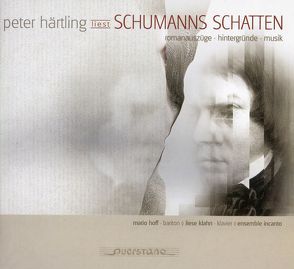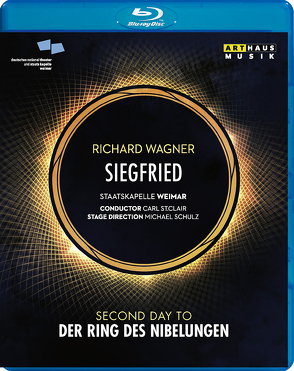
Richard Wagner’s Ring of the Nibelung reflects the composer’s autobiography as much as the political turmoil of his times. As work progressed, another figure grew to be as important as the hero Siegfried, the god Wotan, the mouthpiece for Wagner’s ideas. “He’s exactly like us: he is the sum of today’s intellectual consciousness, whereas Siegfried is what we hope the human being of the future will be, but who cannot be fashioned by us, and who must make himself by means of our destruction!” Our own doom as the basis of a happier future? Second ‘day’ – and third part – of Richard Wagner’s ‘Ring’, the musical saga that its author spent more than a quarter of a century composing. It follows the rise of a young hero, Siegfried, the illegitimate son of the twins whose story we were told in Die Walküre. On the one hand, there is learning about life, glorying in nature and in the emotions, as opposed to those of calculation and greed on the other. This episode shows how Wagner was intent on changing society, on showing that a different kind of man can exist, that the mercenary petit bourgeois world can be replaced by greater humanity and freedom.
Aktualisiert: 2023-05-18
> findR *
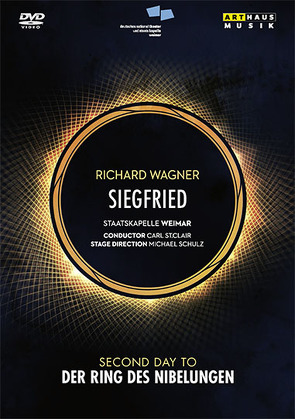
Richard Wagner’s Ring of the Nibelung reflects the composer’s autobiography as much as the political turmoil of his times. As work progressed, another figure grew to be as important as the hero Siegfried, the god Wotan, the mouthpiece for Wagner’s ideas. “He’s exactly like us: he is the sum of today’s intellectual consciousness, whereas Siegfried is what we hope the human being of the future will be, but who cannot be fashioned by us, and who must make himself by means of our destruction!” Our own doom as the basis of a happier future? Second ‘day’ – and third part – of Richard Wagner’s ‘Ring’, the musical saga that its author spent more than a quarter of a century composing. It follows the rise of a young hero, Siegfried, the illegitimate son of the twins whose story we were told in Die Walküre. On the one hand, there is learning about life, glorying in nature and in the emotions, as opposed to those of calculation and greed on the other. This episode shows how Wagner was intent on changing society, on showing that a different kind of man can exist, that the mercenary petit bourgeois world can be replaced by greater humanity and freedom.
Aktualisiert: 2023-05-18
> findR *
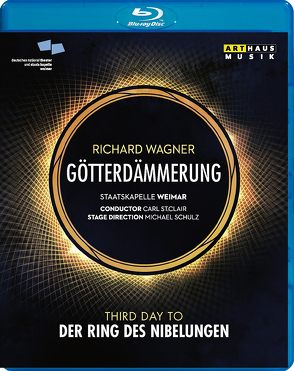
A bleak wind chord of E flat minor opens Richard Wagner’s Götterdämmerung. It establishes the dominant atmosphere of the piece from its first bar: twilight, a deceptive half-light, prevails. Shadowy figures stumble towards the abyss. The last evening of the Ring is one of plotting and betrayal, of ominous oaths, a chilling lust for power, abuse and humiliation – and, also, of a superbly staged apocalypse, when the beings and things destined for destruction shine brightly for one last time. The leitmotivs and thematic ideas from throughout the whole tetralogy recur in Götterdämmerung, intensified and woven into a musical web from which there can be no escape. Everything appears to fit together fatally with everything else. There is nothing more to be done. The net of catastrophe is knotted too fatefully for that, both musically and dramatically. When Wagner sat down to write a prose outline of what turned out as the last part of the Ring, he called it Siegfried’s Death. That was in the year of revolutions, 1848. The new title, usually translated as Twilight of the Gods, came later (Bernard Shaw called it Night Falls on the Gods but that never caught on). All the threads of the drama run now towards the hero’s fall. The death of Siegfried precipitates the final dissolution of the gods’ world, set in train by Wotan when he impiously tore a branch from the World Ash-Tree, and to which the god was already resigned long ago, before he knew of Siegfried’s conception. The natural order has been diverted from its proper course, and the last hope of righting it rests with Siegfried – the human being of the future. He knows no constraints, no fear of violence moderates his thirst for action, he is naïve and spontaneous. To Wagner he represented Utopia, Thomas Mann described him as “harlequin, god of light and anarchistic social revolutionary”, Shaw as “a totally unmoral person, a born anarchist, the ideal of Bakunin, an anticipation of the ‘overman’ of Nietzsche”. Yet he is unfree, nevertheless: he must run on the rails laid by Wotan and thus he is the instrument (one might say, war machine) of the failing power of the old gods as they wait for annihilation. The truly new, however, as Wagner saw it, can only rise from the ashes of the old. So Siegfried too must die, and Brünnhilde, magnanimous in forgiveness, assumes the roles of tragic heroine and redeemer by her self-sacrifice.
Aktualisiert: 2023-05-18
> findR *
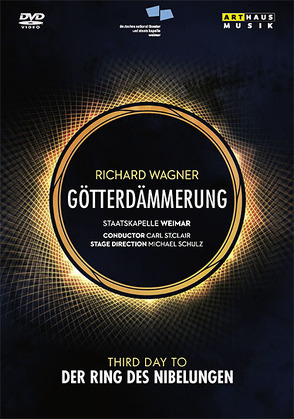
A bleak wind chord of E flat minor opens Richard Wagner’s Götterdämmerung. It establishes the dominant atmosphere of the piece from its first bar: twilight, a deceptive half-light, prevails. Shadowy figures stumble towards the abyss. The last evening of the Ring is one of plotting and betrayal, of ominous oaths, a chilling lust for power, abuse and humiliation – and, also, of a superbly staged apocalypse, when the beings and things destined for destruction shine brightly for one last time. The leitmotivs and thematic ideas from throughout the whole tetralogy recur in Götterdämmerung, intensified and woven into a musical web from which there can be no escape. Everything appears to fit together fatally with everything else. There is nothing more to be done. The net of catastrophe is knotted too fatefully for that, both musically and dramatically. When Wagner sat down to write a prose outline of what turned out as the last part of the Ring, he called it Siegfried’s Death. That was in the year of revolutions, 1848. The new title, usually translated as Twilight of the Gods, came later (Bernard Shaw called it Night Falls on the Gods but that never caught on). All the threads of the drama run now towards the hero’s fall. The death of Siegfried precipitates the final dissolution of the gods’ world, set in train by Wotan when he impiously tore a branch from the World Ash-Tree, and to which the god was already resigned long ago, before he knew of Siegfried’s conception. The natural order has been diverted from its proper course, and the last hope of righting it rests with Siegfried – the human being of the future. He knows no constraints, no fear of violence moderates his thirst for action, he is naïve and spontaneous. To Wagner he represented Utopia, Thomas Mann described him as “harlequin, god of light and anarchistic social revolutionary”, Shaw as “a totally unmoral person, a born anarchist, the ideal of Bakunin, an anticipation of the ‘overman’ of Nietzsche”. Yet he is unfree, nevertheless: he must run on the rails laid by Wotan and thus he is the instrument (one might say, war machine) of the failing power of the old gods as they wait for annihilation. The truly new, however, as Wagner saw it, can only rise from the ashes of the old. So Siegfried too must die, and Brünnhilde, magnanimous in forgiveness, assumes the roles of tragic heroine and redeemer by her self-sacrifice.
Aktualisiert: 2023-05-18
> findR *
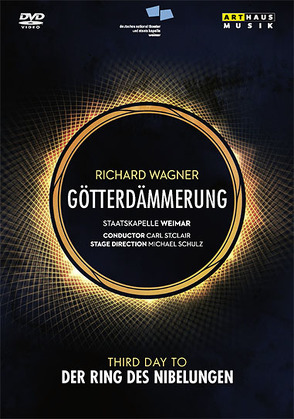
A bleak wind chord of E flat minor opens Richard Wagner’s Götterdämmerung. It establishes the dominant atmosphere of the piece from its first bar: twilight, a deceptive half-light, prevails. Shadowy figures stumble towards the abyss. The last evening of the Ring is one of plotting and betrayal, of ominous oaths, a chilling lust for power, abuse and humiliation – and, also, of a superbly staged apocalypse, when the beings and things destined for destruction shine brightly for one last time. The leitmotivs and thematic ideas from throughout the whole tetralogy recur in Götterdämmerung, intensified and woven into a musical web from which there can be no escape. Everything appears to fit together fatally with everything else. There is nothing more to be done. The net of catastrophe is knotted too fatefully for that, both musically and dramatically. When Wagner sat down to write a prose outline of what turned out as the last part of the Ring, he called it Siegfried’s Death. That was in the year of revolutions, 1848. The new title, usually translated as Twilight of the Gods, came later (Bernard Shaw called it Night Falls on the Gods but that never caught on). All the threads of the drama run now towards the hero’s fall. The death of Siegfried precipitates the final dissolution of the gods’ world, set in train by Wotan when he impiously tore a branch from the World Ash-Tree, and to which the god was already resigned long ago, before he knew of Siegfried’s conception. The natural order has been diverted from its proper course, and the last hope of righting it rests with Siegfried – the human being of the future. He knows no constraints, no fear of violence moderates his thirst for action, he is naïve and spontaneous. To Wagner he represented Utopia, Thomas Mann described him as “harlequin, god of light and anarchistic social revolutionary”, Shaw as “a totally unmoral person, a born anarchist, the ideal of Bakunin, an anticipation of the ‘overman’ of Nietzsche”. Yet he is unfree, nevertheless: he must run on the rails laid by Wotan and thus he is the instrument (one might say, war machine) of the failing power of the old gods as they wait for annihilation. The truly new, however, as Wagner saw it, can only rise from the ashes of the old. So Siegfried too must die, and Brünnhilde, magnanimous in forgiveness, assumes the roles of tragic heroine and redeemer by her self-sacrifice.
Aktualisiert: 2023-03-15
> findR *
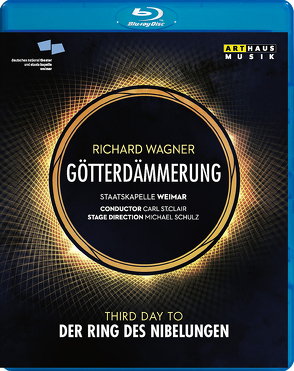
A bleak wind chord of E flat minor opens Richard Wagner’s Götterdämmerung. It establishes the dominant atmosphere of the piece from its first bar: twilight, a deceptive half-light, prevails. Shadowy figures stumble towards the abyss. The last evening of the Ring is one of plotting and betrayal, of ominous oaths, a chilling lust for power, abuse and humiliation – and, also, of a superbly staged apocalypse, when the beings and things destined for destruction shine brightly for one last time. The leitmotivs and thematic ideas from throughout the whole tetralogy recur in Götterdämmerung, intensified and woven into a musical web from which there can be no escape. Everything appears to fit together fatally with everything else. There is nothing more to be done. The net of catastrophe is knotted too fatefully for that, both musically and dramatically. When Wagner sat down to write a prose outline of what turned out as the last part of the Ring, he called it Siegfried’s Death. That was in the year of revolutions, 1848. The new title, usually translated as Twilight of the Gods, came later (Bernard Shaw called it Night Falls on the Gods but that never caught on). All the threads of the drama run now towards the hero’s fall. The death of Siegfried precipitates the final dissolution of the gods’ world, set in train by Wotan when he impiously tore a branch from the World Ash-Tree, and to which the god was already resigned long ago, before he knew of Siegfried’s conception. The natural order has been diverted from its proper course, and the last hope of righting it rests with Siegfried – the human being of the future. He knows no constraints, no fear of violence moderates his thirst for action, he is naïve and spontaneous. To Wagner he represented Utopia, Thomas Mann described him as “harlequin, god of light and anarchistic social revolutionary”, Shaw as “a totally unmoral person, a born anarchist, the ideal of Bakunin, an anticipation of the ‘overman’ of Nietzsche”. Yet he is unfree, nevertheless: he must run on the rails laid by Wotan and thus he is the instrument (one might say, war machine) of the failing power of the old gods as they wait for annihilation. The truly new, however, as Wagner saw it, can only rise from the ashes of the old. So Siegfried too must die, and Brünnhilde, magnanimous in forgiveness, assumes the roles of tragic heroine and redeemer by her self-sacrifice.
Aktualisiert: 2023-03-15
> findR *
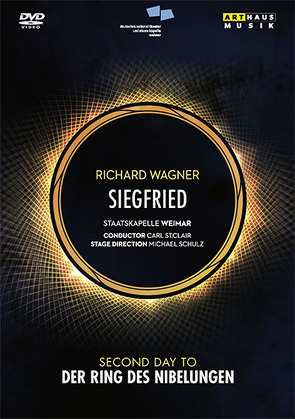
Richard Wagner’s Ring of the Nibelung reflects the composer’s autobiography as much as the political turmoil of his times. As work progressed, another figure grew to be as important as the hero Siegfried, the god Wotan, the mouthpiece for Wagner’s ideas. “He’s exactly like us: he is the sum of today’s intellectual consciousness, whereas Siegfried is what we hope the human being of the future will be, but who cannot be fashioned by us, and who must make himself by means of our destruction!” Our own doom as the basis of a happier future? Second ‘day’ – and third part – of Richard Wagner’s ‘Ring’, the musical saga that its author spent more than a quarter of a century composing. It follows the rise of a young hero, Siegfried, the illegitimate son of the twins whose story we were told in Die Walküre. On the one hand, there is learning about life, glorying in nature and in the emotions, as opposed to those of calculation and greed on the other. This episode shows how Wagner was intent on changing society, on showing that a different kind of man can exist, that the mercenary petit bourgeois world can be replaced by greater humanity and freedom.
Aktualisiert: 2023-03-15
> findR *
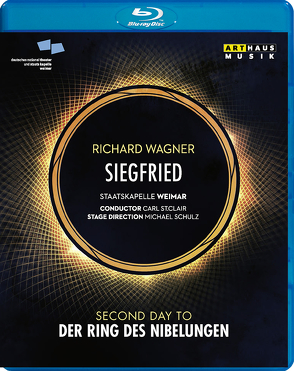
Richard Wagner’s Ring of the Nibelung reflects the composer’s autobiography as much as the political turmoil of his times. As work progressed, another figure grew to be as important as the hero Siegfried, the god Wotan, the mouthpiece for Wagner’s ideas. “He’s exactly like us: he is the sum of today’s intellectual consciousness, whereas Siegfried is what we hope the human being of the future will be, but who cannot be fashioned by us, and who must make himself by means of our destruction!” Our own doom as the basis of a happier future? Second ‘day’ – and third part – of Richard Wagner’s ‘Ring’, the musical saga that its author spent more than a quarter of a century composing. It follows the rise of a young hero, Siegfried, the illegitimate son of the twins whose story we were told in Die Walküre. On the one hand, there is learning about life, glorying in nature and in the emotions, as opposed to those of calculation and greed on the other. This episode shows how Wagner was intent on changing society, on showing that a different kind of man can exist, that the mercenary petit bourgeois world can be replaced by greater humanity and freedom.
Aktualisiert: 2023-03-15
> findR *
Romanauszüge und Hintergründe zu „Schumanns Schatten“, gelesen und erzählt vom Autor Peter Härtling selbst, dazu Lieder und Kammermusikwerke von Robert Schumann
Aktualisiert: 2020-01-01
> findR *
MEHR ANZEIGEN
Bücher von Hoff, Mario
Sie suchen ein Buch oder Publikation vonHoff, Mario ? Bei Buch findr finden Sie alle Bücher Hoff, Mario.
Entdecken Sie neue Bücher oder Klassiker für Sie selbst oder zum Verschenken. Buch findr hat zahlreiche Bücher
von Hoff, Mario im Sortiment. Nehmen Sie sich Zeit zum Stöbern und finden Sie das passende Buch oder die
Publiketion für Ihr Lesevergnügen oder Ihr Interessensgebiet. Stöbern Sie durch unser Angebot und finden Sie aus
unserer großen Auswahl das Buch, das Ihnen zusagt. Bei Buch findr finden Sie Romane, Ratgeber, wissenschaftliche und
populärwissenschaftliche Bücher uvm. Bestellen Sie Ihr Buch zu Ihrem Thema einfach online und lassen Sie es sich
bequem nach Hause schicken. Wir wünschen Ihnen schöne und entspannte Lesemomente mit Ihrem Buch
von Hoff, Mario .
Hoff, Mario - Große Auswahl an Publikationen bei Buch findr
Bei uns finden Sie Bücher aller beliebter Autoren, Neuerscheinungen, Bestseller genauso wie alte Schätze. Bücher
von Hoff, Mario die Ihre Fantasie anregen und Bücher, die Sie weiterbilden und Ihnen wissenschaftliche Fakten
vermitteln. Ganz nach Ihrem Geschmack ist das passende Buch für Sie dabei. Finden Sie eine große Auswahl Bücher
verschiedenster Genres, Verlage, Schlagworte Genre bei Buchfindr:
Unser Repertoire umfasst Bücher von
- Hoffa, Th.
- Hoffacker, Anna
- Hoffacker, Anna Wüstefeld, Kathrin
- Hoffacker, Dr. Maria
- Hoffacker, Helmut
- Hoffacker, Matthias
- Hoffacker, Regina
- Hoffacker, Werner
- Hoffahrt, Christian
- Hoffart, Astrid
Sie haben viele Möglichkeiten bei Buch findr die passenden Bücher für Ihr Lesevergnügen zu entdecken. Nutzen Sie
unsere Suchfunktionen, um zu stöbern und für Sie interessante Bücher in den unterschiedlichen Genres und Kategorien
zu finden. Neben Büchern von Hoff, Mario und Büchern aus verschiedenen Kategorien finden Sie schnell und
einfach auch eine Auflistung thematisch passender Publikationen. Probieren Sie es aus, legen Sie jetzt los! Ihrem
Lesevergnügen steht nichts im Wege. Nutzen Sie die Vorteile Ihre Bücher online zu kaufen und bekommen Sie die
bestellten Bücher schnell und bequem zugestellt. Nehmen Sie sich die Zeit, online die Bücher Ihrer Wahl anzulesen,
Buchempfehlungen und Rezensionen zu studieren, Informationen zu Autoren zu lesen. Viel Spaß beim Lesen wünscht Ihnen
das Team von Buchfindr.








